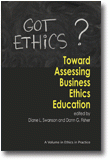
Toward Assessing Business Ethics Education
Edited by:
Diane L. Swanson, Kansas State University
Dann G. Fisher, Kansas State University
A volume in the series: Ethics in Practice. Editor(s): Robert A. Giacalone, Texas State University. Carole L. Jurkiewicz, University of Colorado, Colorado Springs.
Published 2010
Toward Assessing Business Ethics Education, edited by Diane L. Swanson and Dann G. Fisher of Kansas State University, is a sequel to their book Advancing Business Ethics Education in the Ethics in Practice IAP book series. The focus on assessment in this second book is a timely response to the urgent search among business schools for ways to teach and assess ethics at a time when the public’s faith in corporations and business schools has been undermined greatly by the failure of both to respond to widespread corruption and scandals in the business sector. Although no one expects business education alone to resolve these problems, the distinguished scholars represented in this book advocate that business schools should at least do their part by exposing their students to decision models that incorporate ethical dimensions on behalf of corporate stakeholders and society at large. As the book’s title conveys, it is then important to assess key learning objectives to insure that business students graduate knowing ethics fundamentals and armed with the ability to recognize ethical dilemmas and possible solutions during the course of their careers.
This book will speak to all who are interested in accountability for business ethics education, especially business school deans, university administrators, faculty members, students, and prospective employers. This audience will find that the enterprise of assessing business ethics education is advanced in three ways. First, the book functions as a venue for distinguished scholars to share the innovative ways that they are assessing ethics coverage in courses and degree programs. Second, these authors identify what needs to be assessed and the means for doing so. Third, the book serves not only as a guide to assessment, but also as a platform for expanding and improving ethics coverage in business schools. Moreover, an important take away for readers is the provision of a simple formula, first advocated by Diane L. Swanson and William C. Frederick (University of Pittsburgh) in 2005, for delivering ethics education that minimizes assessment errors. By following this formula, business schools can provide assurances that ethics will not be assessed as being sufficient when it is woefully inadequate or even missing in the curriculum and that it cannot be distorted, diluted, or trivialized by uninformed coverage and still pass inspection. Avoiding these assessment errors is critical in an educational environment in which weak accrediting standards for ethics go hand in hand with spotty, uniformed coverage that would not be tolerated for other business disciplines.
CONTENTS
Foreword, Robert A. Giacalone and Carole L. Jurkiewicz. Assessing Business Ethics Education: Starting the Conversation in Earnest, Diane L. Swanson and Dann G. Fisher. The Principles for Responsible Management Education: Implications for Implementation and Assessment, Sandra Waddock, Andreas Rasche, Patricia H. Werhane, and Gregory Unruh. Assessing Business Education in Relation to an Ethic of Service, Rogene A. Buchholz. Assessing Business Ethics Education: Assessment From Where and For What? Lisa A. Stewart and R. Edward Freeman. Assessing MBA Attitudes About Business and Society: Implications for Business Education, Nancy McGaw. Assessing a Virtuous Circle for Socially Responsible Business Schools, Janette Martell and Ángel Castiñeira. Assessing What it Takes to Earn a Beyond Grey Pinstripes Ranking, Janette Martell and Ángel Castiñeira. Assessing Business Ethics Coverage at Top U.S. Business Schools, Barrie E. Litzky and Tammy L. MacLean. Assessing Corporate Social Responsibility Education in Europe: Trends and Comparisons, Marc Orlitzky and Jeremy Moon. Assessing the Integration of Ethics Across Two Business Schools’ Curricula: A Longitudinal Assessment, James Weber. An Integrative Approach to Teaching and Assessing Ethics, Richard P. Mandel and Diane C. Chase. Lessons Learned as Chair of a College Assessment Committee: Implications for Assessing Ethical Reasoning, Brian P. Niehoff. Planning and Personalizing Course Assessment, Steve Payne. A Holistic Method for Assessing Student Performance in a Business Ethics and Society Course, Denis Collins. Assessing Ethics Education in a Business, Government, and Society Course Context, Archie Carroll and Ann Buchholtz. The Case for Assessing Ethics in a Standalone Course and Results From a Pilot Study, Diane L. Swanson, Dann G. Fisher, and Brian Niehoff. Core Knowledge Learning Objectives for Accounting Ethics Education Based on Bloom’s Taxonomy, Linda Kidwell, Dann Fisher, Robert Braun, and Diane Swanson. The Measured Impact of the Transtheoretical Model of Educational Change on Advancing Business Ethics Education, Joseph A. Petrick. Character Assessment in Business Ethics Education, Thomas A. Wright. The Character Journal: An Assessment Tool for Advancing Character Learning, Martin Stuebs. About the Authors.
MORE INFORMATION
> Kansas State University press release about the publication of this book
-
Paperback978-1-61735-162-4
Web price: $62.04 (Reg. 72.99)
-
Hardcover978-1-61735-163-1
Web price: $89.24 (Reg. 104.99)
- eBook9781617351648

-
 Diversity as Strategic Opportunity
Exploring New Paths to Good Administration
Diversity as Strategic Opportunity
Exploring New Paths to Good Administration
-
 Educating in Ethics Across the Professions
A Compendium of Research, Theory, Practice, and an Agenda for the Future
Educating in Ethics Across the Professions
A Compendium of Research, Theory, Practice, and an Agenda for the Future
-
 Ethics and Risk Management
Ethics and Risk Management
-
 Ethics Training in Action
An Examination of Issues, Techniques, and Development
Ethics Training in Action
An Examination of Issues, Techniques, and Development
-
 How to Transform Workplace Bullies into Allies
How to Transform Workplace Bullies into Allies
-
 Organizational Ethics and Stakeholder Well-Being in the Business Environment
Organizational Ethics and Stakeholder Well-Being in the Business Environment
-
 Radical Thoughts on Ethical Leadership
Radical Thoughts on Ethical Leadership

